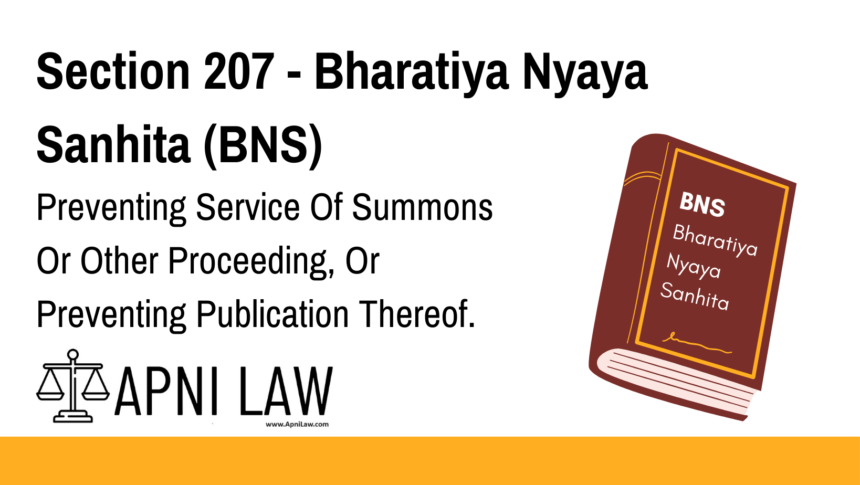Code – Section 207 BNS
Whoever in any manner intentionally prevents the serving on himself, or on any
other person, of any summons, notice or order proceeding from any public servant legally
competent, as such public servant, to issue such summons, notice or order, or intentionally
prevents the lawful affixing to any place of any such summons, notice or order or intentionally
removes any such summons, notice or order from any place to which it is lawfully affixed or
intentionally prevents the lawful making of any proclamation, under the authority of any
public servant legally competent, as such public servant, to direct such proclamation to be
made,––
(a) shall be punished with simple imprisonment for a term which may extend to
one month, or with fine which may extend to five thousand rupees, or with both;
(b) where the summons, notice, order or proclamation is to attend in person or by
agent, or to produce a document or electronic record in a Court, with simple
imprisonment for a term which may extend to six months, or with fine which may extend
to ten thousand rupees, or with both.
Explanation
Section 207 of the Bharatiya Nyaya Sanhita (BNS), 2023, penalizes individuals who intentionally obstruct the service of legal notices, summons, or orders issued by public servants. This ensures that the judicial and administrative processes are not hindered by non-compliance.
Key Elements of Section 207 BNS
- Preventing Service of Summons, Notice, or Order
- If a person avoids receiving a legal notice or helps another person evade service, they can be punished under this section.
- Preventing Affixation or Removing a Summons, Notice, or Order
- If an official notice is affixed to a public or private place and someone removes or damages it, they can be prosecuted under this provision.
- Preventing Proclamation by Authorities
- If a public servant issues a legal proclamation (such as an attachment order), and someone interferes with its announcement or publication, they are liable under this section.
- Punishment
- General offense: Imprisonment up to 1 month, a fine of ₹5,000, or both.
- More serious cases (e.g., avoiding court summons or refusing to produce evidence): Imprisonment up to 6 months, a fine of ₹10,000, or both.
Illustrations
Example 1: Evading a Court Summons
A person refuses to accept a court-issued summons and instructs their family members to lie about their whereabouts. This is an offense under Section 207 BNS.
Example 2: Tearing Down a Public Notice
A municipal authority issues a notice to demolish an illegal structure, and the owner tears down the notice affixed on the property. This act falls under Section 207 BNS.
Example 3: Preventing a Legal Proclamation
A police officer attempts to make an official announcement of property attachment, and the property owner uses force to stop the officer. This is punishable under Section 207 BNS.
Common Questions and Answers on Section 207 BNS
1. What happens if someone refuses to accept a legal notice?
Refusing to accept a notice intentionally can lead to imprisonment or a fine under Section 207 BNS.
2. Is removing a public notice an offense?
Yes, tearing down, removing, or defacing a legal notice affixed by a public servant is a punishable offense under this section.
3. What is the difference between Section 206 and Section 207 BNS?
- Section 206 BNS: Deals with absconding to avoid a legal summons.
- Section 207 BNS: Deals with actively preventing the delivery or publication of a legal summons, notice, or proclamation.
4. What is the punishment under Section 207 BNS?
- General offense: Up to 1 month of imprisonment or ₹5,000 fine.
- If related to a court proceeding: Up to 6 months of imprisonment or ₹10,000 fine.
Conclusion
Section 207 BNS is crucial in maintaining the authority of legal processes. It ensures that court orders, summons, and official notices reach the intended parties without obstruction. Violating this provision can lead to imprisonment, fines, or both.
For more legal updates and insights, visit ApniLaw today! 🚀











